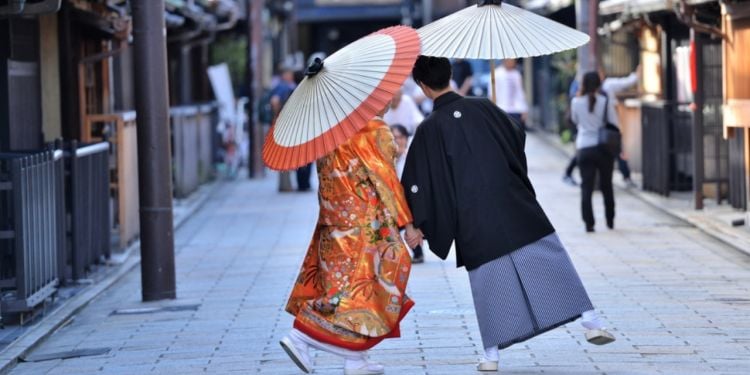
If you plan to get married in Japan, it is essential to register your marriage according to Japanese law for it to be legally binding. In Japan, ceremonies conducted by religious or fraternal organizations are not recognized as legal marriages. Whether you prefer a Western-style wedding or a traditional Shinto-style ceremony, gathering and filing the required paperwork is crucial. This process can be confusing, especially if you are still figuring out where to start. Here are essential things you should know about getting married in Japan as an expat.
Legal requirements for marriage in Japan
Foreigners who want to get married in Japan must follow Japanese law and obtain an Affidavit of Competency to Marry. This document confirms that you are legally eligible to marry and can be obtained from your country's embassy or consulate in Japan.
The Japanese Civil Code, specifically Article 731 to 737, lays out certain conditions that must be met for marriage in Japan:
- The legal age for marriage is 18. Previously, the minimum age was 16 for women and 18 for men. However, with the recent revision of the Civil Code in April 2022, the minimum age is now 18 for both males and females;
- Individuals under 18 cannot marry in Japan unless they have their parent's consent;
- Women are not allowed to remarry within 6 months of getting a divorce;
- Marrying immediate or close relatives is not permitted.
Same-sex marriage in Japan
Currently, in Japan, marriage is only allowed for couples of the opposite sex. The legal sex mentioned in their family registry is used to determine their eligibility for marriage. Therefore, even if a couple identifies as the opposite sex, they cannot marry if their legal sex is the same.
In 2015, the Shibuya and Setagaya wards in Tokyo, Japan, introduced a special partnership certificate for same-sex couples. Since then, the number of districts and cities adopting same-sex partnerships has risen significantly.
By June 28, 2023, 328 local governments had acknowledged same-sex couples as equal to marriage and provided them with a certificate that does not hold legal weight.
Since same-sex marriage in Japan is not legal, the visa status for spouses based on civil status does not apply to same-sex spouses.
Suppose you and your same-sex spouse are non-Japanese nationals. In that case, however, you may bring your spouse to Japan if both countries have legalized same-sex marriage and officially registered your marriage in each country.
Visa for same-sex marriage with a Japanese national
As mentioned above, same-sex marriage is not legal in Japan. That means a foreign national who is in a same-sex marriage with a Japanese spouse cannot apply for a Spouse of Japanese National visa.
As a result, the only option to live together long-term is to obtain a work visa. If you are currently on a work visa, you can marry a Japanese national according to the laws of your country, but you cannot register your marriage in Japan.
Visa for same-sex marriage between non-Japanese people
In contrast to the previous case, the Japan Immigration Office allows non-Japanese same-sex couples to obtain a visa if they are legally married in their respective countries and if one of the partners is already living in Japan under a work visa status.
Typically, in the case of a different-sex marriage, the spouse of a work visa holder can apply for a Dependent visa status. However, in the case of same-sex couples, the spouse is eligible for Designated activities as an exception visa.
However, the application for Designated activities as an exception can only be made while the applicant is in Japan. Therefore, the applicant must first come to Japan on a 90-day Temporary Visitor visa to apply for a change of visa status from Temporary visitor to Designated activities. During this process, the spouse with a work-related visa will be the guarantor and supporter.
Required documents when getting married in Japan
Here is a list of documents you need to prepare to register a marriage in Japan:
From either partner:
- Kon-in todoke - Marriage registration form
You can get this form at any city/ward office or download it from their official website. Two witnesses must fill out a section in the document, so make sure you and your partner sign it beforehand or bring it to the city or ward office with your witnesses to complete the application. In Japan, to be a witness, one just needs to be of the required age, whether Japanese or not;
- Registration/associated fees (may vary).
From foreign partner:
- Valid ID
A valid passport, residence card, My Number card, or driver's license is often sufficient;
- Birth certificate
You may need to submit your original birth certificate depending on the municipality where you register your marriage. Depending on the foreigner's nationality, an official copy instead of the original may be accepted;
- Kon-in yōken gubi shōmeisho - An Affidavit of Competency to Marry / A Certificate of No Impediment (CNI) to Marriage
Foreigners must provide this document verifying their legal ability to marry. You can obtain this certificate quickly from your embassy or consulate. Your embassy or consulate can provide this document for a notarial fee;
- A copy of any/all divorce certificates/judgments (if you're divorced).
From Japanese partner (if applicable):
- Koseki tōhon - Family register
In the case of a Japanese national who gets married outside of the Registered Domicile, this document is a must.
If you and your partner are non-Japanese, you can skip this requirement.
Remember to attach Japanese translations to all documents in a foreign language. You don't need a professional translator as long as the names and places are translated and written in katakana.
Your municipal office may require additional documentation, so it's always a good idea to check with your local city office before submitting the paperwork. You can find more information on the Ministry of Justice's website.
Registering the marriage via mail is possible if one partner is a Japanese national. In this case, you must send all the required documents, including photocopies of both partners' IDs and family registry, through postal mail.
Once all the required documents are processed and approved, you will be officially married. In addition, if you or your partner is a foreigner, you may need to report your marriage to your embassy or consulate. However, some countries do not require this step. Check your embassy's website or contact them to confirm if you need to do so.
Celebration of the civil marriage in Japan
The celebration of the civil marriage is done at the town hall. It is called "nyû seki suru".
Spouses must present the kon-in todoke and all required documents to the registrar. It is called the "filing of the declaration of marriage". Both spouses' presence is mandatory. Otherwise, the Public Prosecutor will invalidate the marriage (article 146-1 of the Civil Code).
You need also keep in mind the town hall's office hours. Some are open on holidays and weekends while others will require you to come only during the work week.
Applying for a spouse visa in Japan
It's worth noting that the spouse visa to Japan (haigûsha visa, spouse or child visa) is only granted to married couples. Same-sex couples and couples in a civil union in Japan are not eligible for this visa. Being married does not guarantee a visa to Japan.
In case you are not yet a resident of Japan
If you still need to become a resident of Japan, you must have a CoE (Certificate of Eligibility) to apply for a visa. Your Japanese spouse can request it from the Japanese immigration authorities. The situation is still delicate because of COVID-19, so check regularly with the competent authorities, especially concerning the deadlines.
In case you already live in Japan
Go to the immigration services with the following documents:
- A visa application form;
- A certificate of residence (can be obtained at the city hall);
- The family register mentions the marriage;
- A questionnaire about your life: when did you meet your Japanese spouse, for example;
- Passport-size photos;
- Informal photos of you and your Japanese spouse (on a walk, in a restaurant, on a trip, etc.);
For the past several years, Japan has stepped up its fight against white marriages. The authorities are looking to see if you are marrying for love;
- A letter of guarantee written by your spouse and a family member;
- A photocopy of your spouse's tax statement;
- Your identity papers: passport, resident card (zairyû card);
- Your marriage certificate (konin todoke kisai jiko shômei).
If your application is accepted, the immigration services will ask you to provide a tax stamp (about 4,000 yen = about 25 euros), passport, and resident card. They will stamp your card to issue your new resident card as a spouse.
Types of wedding ceremonies in Japan
Remember that only civil marriage is legally recognized in Japan. Of course, nothing prevents you from having a religious or a lay wedding. It is called the "kekkon shiki" (wedding ceremony).
Although traditions are still alive in the Land of the Rising Sun, western weddings are gaining popularity, especially among the younger generation. The famous wedding dress has become the center of attention.
Traditional or Shinto wedding (shinzen kekkon)
The bride and groom first celebrate the "nosai no gi", the traditional engagement ceremony. It is followed by the "shinzen shiki", the "marriage before the gods". The rites take place in a Shinto shrine. A Shinto priest, assisted by a "miko" (a young priestess) organizes the ceremony (shinshoku).
The priest first purifies the couple. Then comes the "san san kudo no hai", a ceremony during which the spouses drink three cups of red lacquer prepared by the miko, containing sake. "San" means "3" in Japanese, and "kudo" means "9 times". The number 9 is supposed to bring luck. The three cups represent the past, the present, and the future.
Then comes the exchange of vows (seishi sôjô). The couple, in traditional costume, will then read out loud a scroll handed to them by the miko.
At the end of the ceremony, the bride and groom and their guests drink a cup of sake.
Church weddings in Japan
In Japan, Christians represent barely 1% of the population. Nevertheless, the church wedding is trending. Some follow their faith, and those are attracted by the warmer atmosphere of Western weddings, the culture, the fashion, and the images conveyed by social media.
Depending on their faith, Christians who get married in a church are baptized and present themselves before the priest, pastor, or orthodox priest. A sermon or exhortation is given before or after the exchange of rings. Since "Christian" means "of Christ", Christians are married before God. They exchange vows and pledge fidelity to each other.
Most Japanese church weddings are outside of this framework. The bride and groom are usually not baptized. The church can be a real place of worship or simply a chapel attached to a reception place.
The general framework of matrimonial regimes in Japan
The universal community regime makes the bride and groom jointly and severally liable for all assets, including income and debts. All property acquired before and during the marriage becomes common to the couple.
The separation of property allows each spouse to keep all property and income acquired before and during the marriage. There is no solidarity in the face of debt. It is the regime of financial autonomy.
The reduced community of property guarantees that each spouse keeps the property and income acquired before the marriage. Afterwards, everything belongs to both spouses.
In Japan, the default matrimonial regime is the separation of property. However, if one of the spouses owns an asset without being able to justify it, it will belong to both spouses.
Good to know:
While some countries allow matrimonial regime change after marriage, this is not possible in Japan.
FAQs about getting married in Japan
Do I have to change my name after getting married in Japan?
Article 750 of the Japanese Civil Code states that when a couple gets married, they can take the surname of either the husband or the wife. It is common for women to take their husbands' surnames, but this rule does not apply to international marriages.
On the other hand, the child born in Japan will take the name of the Japanese spouse. It is possible to ask for a name change by going to court. Note that in Japan, compound or multiple names do not exist.
Do I have to marry a Japanese national to get married in Japan?
No. Two foreign nationals can get married in Japan as long as the civil authorities representing their country and the officials authorized to celebrate the marriage are present in the country.
Foreigners who want to get married in Japan must follow Japanese law and obtain an Affidavit of Competency to Marry. This document confirms that they are legally eligible to marry and can be obtained from their country's embassy or consulate in Japan.
Do they issue marriage certificates in Japan?
Japan issues two types of marriage certificates:
- Kekkon-todoke juri shōmeisho (婚姻届受理証明書): The Certificate of Acceptance of Notification of Marriage;
- Kekkon-todoke kisai jiko shōmeisho (結婚届記載事項証明書): The Certification of Information Recorded on Marriage Registration.
Which matrimonial regime should I choose in Japan?
Japan has three main types of matrimonial regimes:
- The universal community of assets;
- The legal community of assets;
- The separation of assets regime.
It's worth noting that some people reject the separation of assets regime in the name of love. Instead, they choose the universal community of assets for fear of offending their partner.
However, protecting oneself is not a sign of lack of trust. Even the universal community of property can include clauses allowing the recovery of assets acquired before the marriage or in the event of the spouse's death.
The most important thing is to understand what each regime commits you to.
How much does it cost to register a marriage in Japan?
As you may have guessed, the mandatory transcriptions with authorized agencies are not free. You should pay 350 to 1400 yen (about 2.21 to 8.84 euros) to obtain proof of the marriage notification.
In addition, the affidavit service might cost you 50 euros (about 8000 yen). The affidavit is a statement that the foreign spouse who owns movable property makes under oath before a legal authority. The foreign spouse can claim tax exemption on these assets, as they are already taxed in their home country.
How much does it cost to get married in Japan?
A traditional wedding in Japan can be expensive, about 100,000 yen (720 euros), and prices can go up to more than 3 million yen (about 21,000 euros). A church wedding can be just as expensive.
That's why many couples in Japan prefer a "basic" wedding, limited to the essentials with a few relatives and a banquet. This formula is especially appealing to younger generations. It is, in fact, an advantage in these times of health and economic crisis.
Other couples opt for several small separate celebrations. The wedding ceremony is reserved for the family and close friends, while the banquet is for acquaintances (mainly work colleagues and business relations). The party (nijikai) is for friends. It is the time when the young couple chills. The atmosphere is relaxed, and all the friends participate in the expenses.
Useful links:
We do our best to provide accurate and up to date information. However, if you have noticed any inaccuracies in this article, please let us know in the comments section below.








